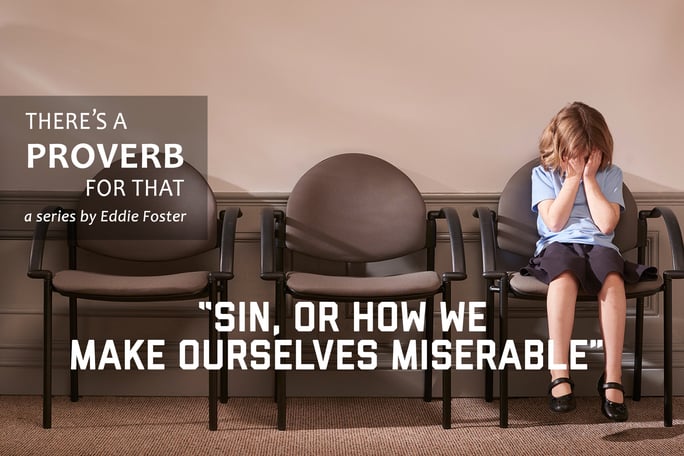Proverb: “Sin, or How We Make Ourselves Miserable”
“Sin” has become a forgotten word in our society. But it wields enormous impact over us, even if we ignore it. Of course, there’s a proverb for that.

But regardless of our views on it, we are surrounded by sin and its consequences. In a world of shifting morality, debate may rage about what society should define as sin, but the idea that there is a right and wrong is timeless, just like Proverbs.
Defining sin
Sometimes we focus only on things we personally don’t like and label those sin. It may be unfairness. It may be a vague notion of doing harm to others. But, however we decide to define it, there is sin and the Bible clearly defines it. Sin is breaking God’s law (1 John 3:4).
Breaking the beneficial law established by our Creator who loves us always creates problems. In fact, nearly all of the contemporary issues we face today have their roots in sin: racism, sexual objectification, hatred, fraud, murder, war, thievery, taking advantage of the weak, and on and on the list could go.
The Bible declares that the end result of sin is misery, suffering and ultimately death (Romans 6:23). Since its consequences are so clear, then to cheapen its meaning is not just a problem—it is the problem. Thankfully, there’s a proverb for that.
Proverbs and implications
1. Proverbs 20:9: “Who can say, ‘I have made my heart clean, and I am pure from my sin’?”
A huge problem with sin is that every human being has done it, and continues to do it. Even Christians, who are striving to be faithful to God, sin. This was the reason Jesus Christ died for humanity; because His death is the only pathway out of sin’s natural end: death. That’s why when we openly acknowledge that our sin is sin, confess it to God and try our best with God’s help to change—we obtain mercy (Proverbs 28:13).
When we openly acknowledge that our sin is sin, confess it to God and try our best with God’s help to change—we obtain mercy.
Implications: The worst mistake we can make is saying we have no sin (1 John 1:8). Sin is not something that should be excused, justified, redefined or ignored. Humanity has been doing that for thousands of years and has reaped the horrific consequences. We all are guilty of it, and the world would be a much better place if we all tried to get rid of more of it in the only lives we can control: our own.
2. Proverbs 14:34: “Righteousness exalts a nation, but sin is a reproach to any people.”
Another problem with sin is that, like a bad attitude, it spreads. It usually starts as a personal issue, but eventually it creeps throughout a society. Many nations and empires have fallen because of moral decay (a fancy way of saying sin). Sowing sin definitely leads to sorrow on a national level (Isaiah 1:4-6).
Implications: Don’t get carried away in a national flow toward sin, even if it’s not being called sin. In all the chaos and confusion surrounding conflicting ideologies, shifting standards, greedy interests and very little direction from mainstream religion, remember God’s timeless truth. It is so unpopular to do that, but it is the only thing standing in the way of completely forgetting about why sin should be overcome and not normalized.
To understand just what the opposite of sin is, download our booklet God’s 10 Commandments: Still Relevant Today.
3. Proverbs 14:9: “Fools mock at sin, but among the upright there is favor.”
It may not bring us great wealth, power or fame, but taking sin seriously can help us rest at ease that we are not regularly hurting other people or our relationship with our Creator. Mocking at it and pretending it doesn’t exist or that it is defined by our narrow biases will prove to be destructive in the long run. It is better to avoid and fight it instead of just going with the flow of our society (Proverbs 1:10-16). God favors those who try to overcome sin.
Implications: “I’m human and I make mistakes” is an acceptable starting point, but a lousy ending point. We wouldn’t accept the same weak approach from those directly sinning against us and bringing us sorrow or misfortune. We would want them to go further to stop doing what they’re doing. And that’s what we should push ourselves to do. Not taking sin seriously is bad news for our future and the futures of all those around us.
Plenty more where those came from
The book of Proverbs speaks about sin extensively, from specific instances of behavior God hates to striking parallels of what sinful behavior does to us. The theme is as old (and timeless) as the book itself: Sin destroys individual lives and societies, so deal with it instead of ignoring or denying it. When sin is lurking about incognito, remember, there’s a proverb for that.
Read the next blog in this series: “Taking Correction, or How Not to Be Stupid.”
Date Posted: May 15, 2017

 by Eddie Foster
by Eddie Foster

